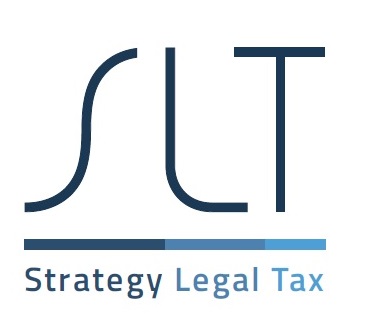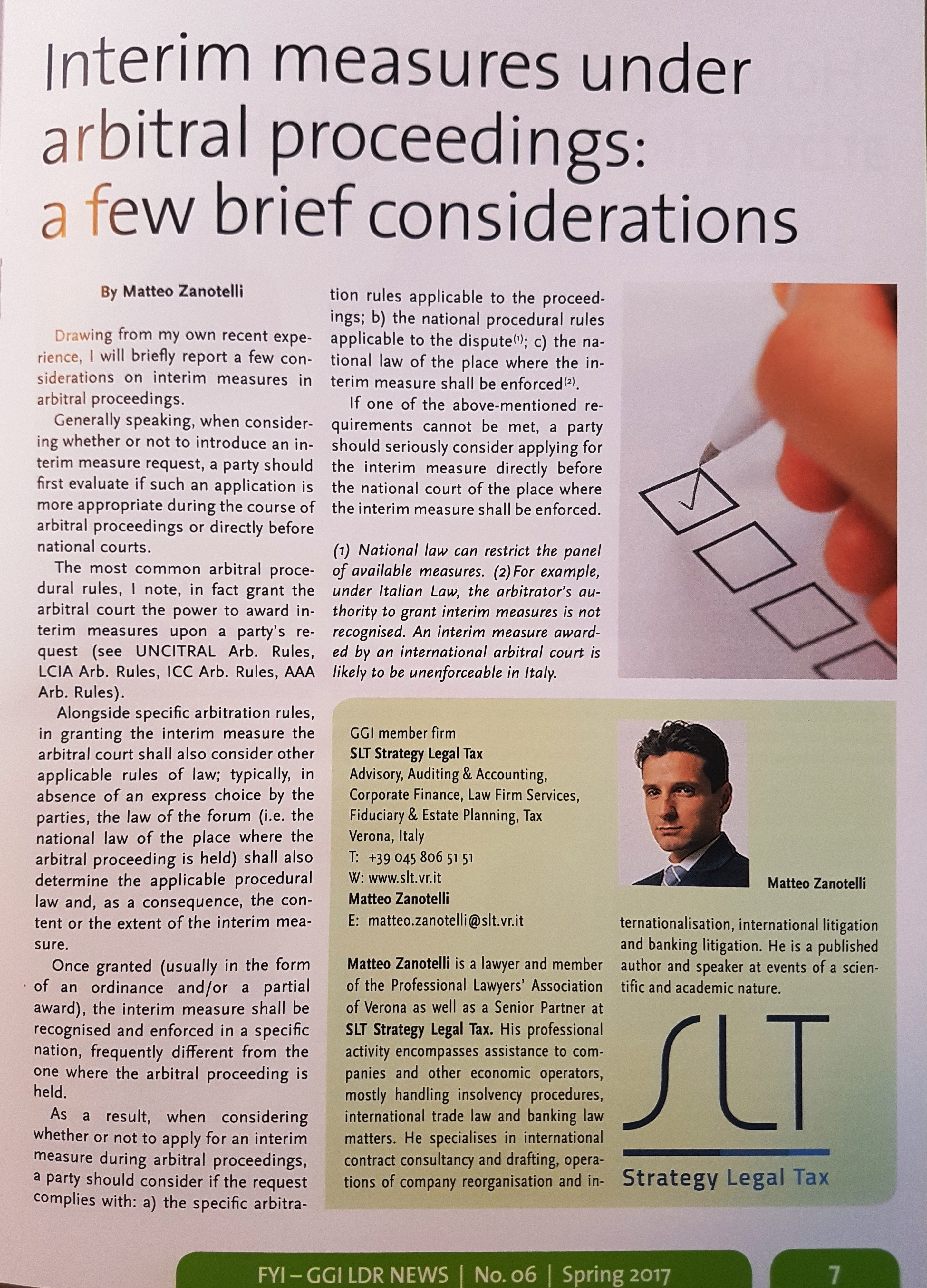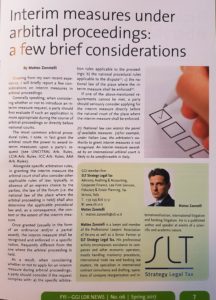Claudio Ceradini has been nominated European President of Debt Collection, Restructuring & Insolvency PG in GGI
/0 Comments/in News-en/by Claudio CeradiniClaudio Ceradini has been nominated European President of Debt Collection, Restructuring & Insolvency PG in GGI.
«I’m sure it’s a great opportunity for a candid and positive discussion about institutional rules efficiency, but first of all for moving a step forward in advisory approach innovation in such engagements, especially in turnover plans.
EPC Contract and CISG: the coexistence is possible
/0 Comments/in /by Matteo ZanotelliDuring a recent case of mine, that I’m currently handling before the ICC Arbitral Tribunal, I’ve had the opportunity to discuss the well-known problem of the applicability of the UN Vienna Convention 1980 on Contracts for the International Sale of Goods (CISG) to the so-called EPC Contract (Lieferverträge mit Montageverpflichtung, or Turnkey contracts).
In particular, I debated whether a contract for the engineering and erection of an energy plant (bio-mass plant) falls within the scope of Vienna Convention.
Passed the applicability test according to art. 1 CISG, the Arbitral Court verified whether or not the Convention applies to the matter pursuant to art. 3.2 CISG, precisely drafted in order to solve such a kind of problem:
Art. 3.2 CISG: This Convention does not apply to contracts in which the preponderant part of the obligations of the party who furnishes the goods consists in the supply of labour or other services.
In interpreting the above-mentioned provision, the Arbitral Court aligned itself with the most reliable opinion, according to which art. 3.2 CISG simply refers to the comparison between the economic value of the obligations regarding the supply of labour and services and the economic value of the obligations regarding the delivery of the goods (the so-called “economic criterion“; in these terms, among others Prof. F. FERRARI, Prof. P. SCHLECHTRIEM, THE ADVISORY COUNCIL on CISG).
Considering that the value of the goods to be provided under the contact was undisputed and much higher (80%) than the value of the related services/labour, the Arbitral Tribunal found that the CISG applies to the matter.
This decision can be considered an important further step for the application of the CISG to EPC Contracts and the creation of a reliable and stable pattern of rules.
Note: the case and the questions involved in the matter have been simplified for the scope of this short presentation. Much more issues have been discussed and solved by the parties’ representatives and the Arbitral Court before achieving the cited solution. Consequently, do not consider this presentation as a formal/conclusive opinion.
Curious and courageous, this is the future of the professions
/0 Comments/in Magazine-en, Strategy-en/by Claudio CeradiniA restarting plan business-case gave me the opportunity during GGI European Conference to talk about innovation in the advisory world.
Even big advisory companies usually suggest their clients to focus on innovation and on customers requests, to improve their market position and competitiveness.
But, are we sure the teacher runs better than the pupil? Just giving a look to most famous and big law firms in Europe, the perception I had is that they have always been focused on services they were skilled on. A kind of product oriented (or I would say service oriented) approach, assuming the market is able to understand how and when those services could be useful or not.
Time flies and customer’s requests change. A question we were asked a couple of weeks ago is “how to reduce the supply chain, what business model to be used, or technical plant solution to be selected”. Financial support and legal solutions become needed only when the project globally seems to make sense. Our customer didn’t care what skills or professionals were needed, he asked for reliable answer to a complicated question, at a reasonable price.
Advisors are asked to modify their approach, from services oriented to client and problem solving oriented. less talented and instinctive, and much more managerial and organized, with internal structure and functions. Even different professional skills can be included in the same advisory company, as they are useful to fit customers needs and to get enterprise value empowering solutions.
What advisory companies need, finally, to increase customer sensitivity, and managing attitude. From this angle dimension makes investments in innovation and communication possible, and creates specialized skills, needed to answer customers requests. Managing attitude creates efficiency and rules, to have a competitive machine in place.
It is an awesome opportunity for the future, together with an exiting challenge. As in the middle 1970’s, we should stay hungry, and foolish.
Matteo Zanotelli on GGI – Litigation and Dispute Resolution News
/0 Comments/in News-en/by Matteo ZanotelliInnovation, even in advisory world. Claudio Ceradini at the GGI European Conference
/0 Comments/in Magazine-en, Strategy-en/by Claudio CeradiniWhat advisors should think about, in Italy but not only, is something new.
The focus of almost all advisory companies, even if big and competitive, has always been on services they were skilled on. A kind of product oriented (or I would say service oriented) approach, assuming the market is able to understand how and when those services could be useful or not. This assumption is for sure appropriate for big companies, well organized and based on professional and efficient managing direction. Strategies and business developing path is in these circumstances under control and companies clearly know when and what kind of professional services are needed.
By the way, this situation is not peculiar, and big companies are not a significant part of the Italian, and I would say south European, business and economic system. A big part of operators are medium and small companies, family based and depending from owners entrepreneurial skills. Since small companies are often grown up personal businesses, managed with great and deep technical knowledge, but just essential strategic sensitivity and financial experience, what modern advisors are doing is to modify their approach, from services oriented to client and problem solving oriented. It is a huge modification of the way advisors are used to think about their job, less talented and instinctive, and much more managerial and organized, with internal structure and functions, and costs and efficiency control IT systems. Even different professional skills begin to be included in the same advisory company, as they are useful to fit customers needs and to improve solutions. Sometimes happens that engineers or marketing experts become part of a law and tax firm, since they are part of the professional teams working on solutions, more than on single and particular services. This is the only way to create value for customers which doesn’t ask for a due diligence, or a merger, or a legal advise, but a support on a project. What we need today is to be able to support a customer who asks you for example how to reduce supply chain, what business model to be used, or technical plant solution to select. Financial support end legal solutions come just after, when the project globally seems to make sense. It doesn’t matter what skills or professionals are needed, but just a reliable answer to a reasonable price. All these circumstances request marketing, strategic, technical skills to work together, and to pick them up outside the company just when needed is often not enough, because team-thinking is not an attitude easy to be found and improved.
On the other hand, customers need day by day support from a tax and legal view. Accountancy, tax returns, daily legal fulfilments, applications and assistance are part of the support that small companies absolutely need, to avoid expensive mistakes. This activity is not easy, needs continuous legal update and consistent skill, but doesn’t create immediate and broad value. What is expected is an increasing level of support and decreasing fees, so that only a high efficiency level can keep profits on a reasonable level.
What advisory companies needs in Italy is, finally, to increase dimension and managing attitude. Dimension makes investments in innovation and communication possible, and creates specialized skills, needed to answer customers requests. Managing attitude creates efficiency and rules, to have a competitive machine in place. It is an awesome opportunity for the future, together with an exiting challenge.
Matteo Zanotelli speaker at the Wine Learning seminar
/0 Comments/in News-en/by Matteo ZanotelliToday 30.3 will be held the Wine Learning seminar that the Chamber of Commerce of Verona has dedicated to the theme of the internationalization of wineries.
The seminar will address the opportunities and critical issues that present, for wine companies, two of the reference markets: the People’s Republic of China (whose peculiarities will be illustrated by Cav. Armando Tschang – President of Agency for China) and the United States of America (whose potentialities will be indicated by the undersigned).
I would like to express my gratitude to Barbaria Bianconi of ADEXE, who has promoted the whole series of seminars, and to colleagues and friends, Mr. Charles S. Baldwin, IV and Mr. Mark Devidson of the American Brooks & Pierce, who do not have technical problems could actively participate in the initiative, but without the help of which the seminar would not have been possible.










